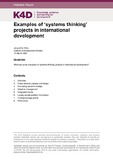| dc.contributor.author | Hicks, Jacqueline | |
| dc.coverage.spatial | Uganda,Vietnam | en |
| dc.date.accessioned | 2022-06-24T09:43:07Z | |
| dc.date.available | 2022-06-24T09:43:07Z | |
| dc.date.issued | 2022-03-15 | |
| dc.identifier.citation | Hicks, J. (2022). Examples of ‘systems thinking’ projects in international development. K4D Helpdesk Report. Institute of Development Studies. DOI 10.19088/K4D.2022.067 | en |
| dc.identifier.uri | https://opendocs.ids.ac.uk/opendocs/handle/20.500.12413/17491 | |
| dc.description.abstract | A “systems thinking” (ST) approach generally recognises that international development processes are complex, inter-related, non-linear, and constantly changing. They involve many different types of actors, all with different levels of power. ST change methods try to mirror these qualities, and move away from more conventional project design and implementation that use simple linear input-output-impact project logic. Thus, this rapid literature review seeks to find out what are some examples of ‘systems thinking’ projects in international development. The aim of this rapid review is to provide concrete examples of how ST shows up in the project design and management processes that are typically used by people working in the international development sector. These include project management arrangements, evaluation indicators, results frameworks, budget allocations and procurement, country diagnostics, and the foundational analysis that informs project design. The examples found were mostly extracted from donor project documents. Different definitions of ST may emphasise different elements. An attempt was made to find a range of projects from different sectors, and to go beyond projects that exemplified “Market Systems Development” and “Adaptive Management,” for which there are already repositories of project examples (see Further Resources).The inclusion of the projects in this review does not imply that they were successful, only that they contain some evidence of ST in them. Most of the projects identified have a further library of documents, including evaluations, that give more detailed information about their successes and failures. | en |
| dc.description.sponsorship | Foreign, Commonwealth and Development Office (FCDO) | en |
| dc.language.iso | en | en |
| dc.publisher | Institute of Development Studies | en |
| dc.relation.ispartofseries | K4D Helpdesk Report;1126 | |
| dc.rights.uri | https://www.nationalarchives.gov.uk/doc/open-government-licence/version/3/ | en |
| dc.subject | Development Policy | en |
| dc.title | Examples of 'Systems Thinking' Projects in International Development | en |
| dc.type | Helpdesk | en |
| dc.rights.holder | © Crown copyright 2022 | en |
| dc.identifier.doi | 10.19088/K4D.2022.067 | |
| dcterms.dateAccepted | 2022-03-15 | |
| rioxxterms.funder | Default funder | en |
| rioxxterms.identifier.project | K4D | en |
| rioxxterms.version | VoR | en |
| rioxxterms.versionofrecord | DOI 10.19088/K4D.2022.067 | en |
| rioxxterms.funder.project | 42a141a4-4b80-406f-9c57-3bb186f136c1 | en |

